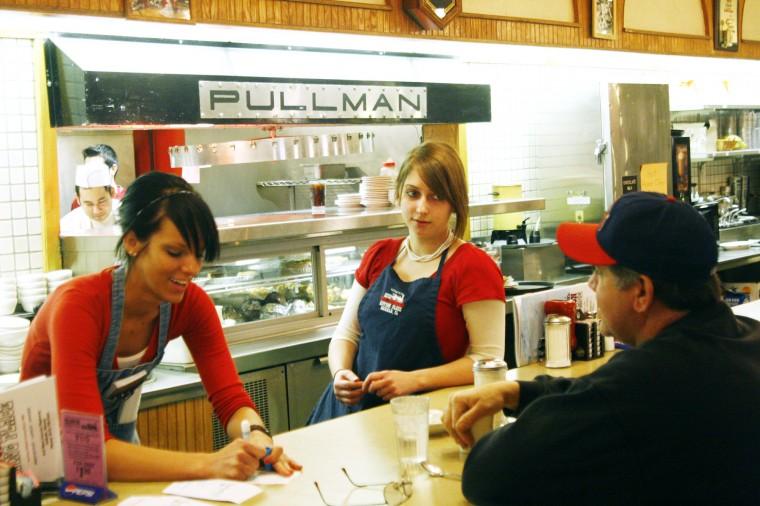Some businesses safe from salmonella outbreak
Courtney Levit, left and Sara Grant wait on a regular customer, Mike, at The Junction in this Jan. 31 file photo. The Junction is one local business that has not been affected by recent egg recalls because the company uses locally harvested eggs.
September 7, 2010
The recent egg recall that worried the nation was of little concern for some local businesses.
The Junction Eating Place, 816 W. Lincoln Highway, a local restaurant was not affected at all, said supervisor George Bahramis. “We buy all our eggs locally from a DeKalb County supplier. His name is ‘Ross’ the egg man.”
Loreen Stravers, purchase orderer at Duck Soup Coop, 129 East Hillcrest Drive , said, “We get local eggs so we weren’t affected at all.”
Two local brands they [Duck Soup] carry are Phil’s Fresh Eggs and Green Meadow Farm. “One of the unique features about our company is that we are ‘vertically integrated’ which means that we create our own feed and we are able to have more control over the quality and sanitation of the feed,” said Phil Wubbena, president of Phil’s Fresh Eggs, Inc. “We’ve produced cage-free eggs for 50 years and have always taken precautions to ensure bio-security such as making sure we are rodent and fly-free. But the bottom line is, all eggs are safe to eat if they are properly cooked.”
As the Food and Drug Administration continues its investigation of the nationwide recall of over half a billion eggs contaminated with salmonella, Wright County Egg and Hillandale Farms of Iowa remain the central source for the contaminated eggs.
“From May 1 to Aug. 25, 2010, a total of 2,403 illnesses were reported. However, some cases from this period have not been reported yet, and some of these cases may not be related to this outbreak,” said investigators from the Centers for Disease Control and Prevention.
The source of the salmonella outbreak maybe caused by contaminated feed, according to FDA officials.
However, “salmonella is a bacterium that is normally passed from chicken to chicken through fecal matter,” said doctoral student Renee Kopulos, who works on chicken immunology.
According to inspection observations of Hillandale Farms conducted by FDA officials, “hens were tracking manure from the manure pit into the upper level of the caged hen house area.”
“Because these eggs sit at room temperature for a number of days and their shells are very porous, it’s very easy for salmonella to get into the eggs and multiply very rapidly,” Kopulos said.
To reduce the risk of getting salmonella, the FDA recommends consumers should not only thoroughly cook their eggs but wash hands and all surfaces that touch raw eggs. Also, “the FDA would like to remind all consumers against eating any raw food products that may contain shell eggs that are supposed to be cooked or baked before eating because they could make you sick.”













